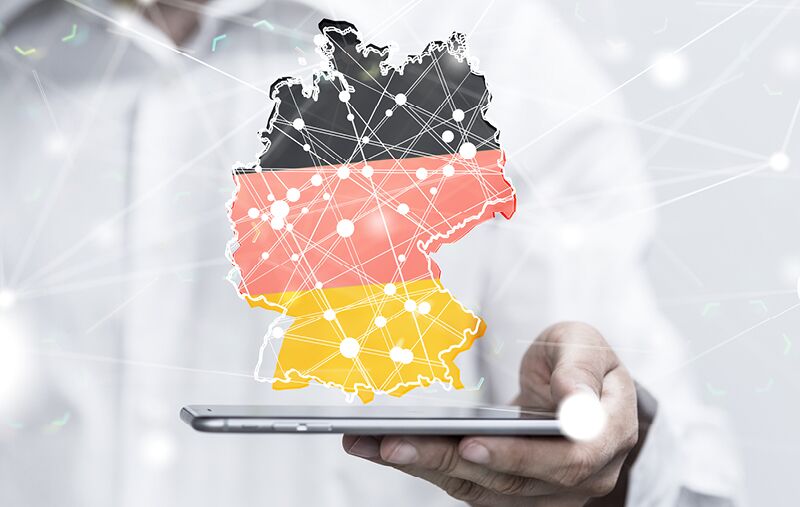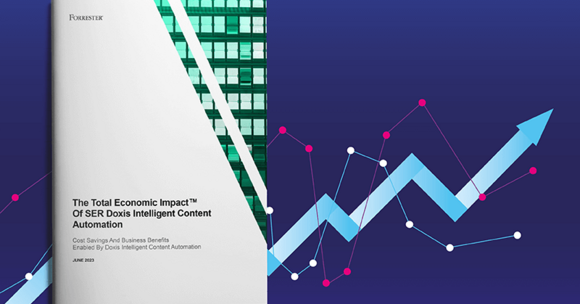SER Blog Customer Stories & Use Cases
Smart cities: Germany’s most digital places to live
| Julia Pedak
How digital are Germany’s cities? This question was asked by Bitkom in its latest Smart City Index. A total of 81 cities were assessed according to their level of digitization. But when does a city count as “digital” and what can it do to achieve this status? The best practices of Germany's most digital cities demonstrate how.

Cities should have a benchmark for measuring their level of digitization. This was the starting point for the Bitkom report, the Smart City Index, which studied 81 German cities with populations over 100,000. The German cities were rated using 96 separate benchmarks in the categories of mobility, society, energy/environment, IT infrastructure and administration.
Scoring big with eGovernment
Broadband and WiFi access, intelligent traffic signals and streetlights, e-vehicles or coworking offerings – these are the smart measures that directly impact daily life in cities. However, the administrative work of cities, which we don’t usually notice – unless, of course, we have to wait for appointments or requests to be processed – also plays a large part in digitization. This is where solutions such as document management, electronic invoices and digital services for residents can be effective. These are some of the benchmarks that the Smart City Index looked at in its administration category. They make communication and cooperation between the city’s administration and its residents more convenient, faster and more transparent for everyone.

Efficient eGovernment
Learn how the City of Bochum creates transparency and accountability in case of liability issues, provides the public information at all times, automates invoice processes, and more with ECM.
Read nowBest practice 1: Smart city strategy
Successful digitization requires a good strategy to build on. The City of Bonn has taken this to heart and is currently pursuing its own Smart City Strategy. No wonder it ranks second after Berlin in the Smart City Index. For Bonn, which is home to several federal agencies, being a smart city means being innovative and focusing on the public. Bonn aims to achieve this by improving the level of digitization and the quality of its services. In addition to projects in the public sphere aimed at making Bonn more efficient, more technologically advanced and sustainable digital administration is a key pillar of the city’s smart city strategy. In addition to implementing online services for its residents, the City of Bonn also focuses on designing a digital workspace and IT workflows. Bonn is working with the SER Group to build the digital workspace: enterprise content management (ECM) solutions such as workflow-based processes, electronic archiving, and digital files make administrative processes more transparent, faster and thus more public-friendly.
Best practice 2: Electronic municipal archive
City council meeting minutes, records, files related to citizen requests – this and much more can be found in a city archive. While preserving a city’s history for future generations, the archive also plays an active role in everyday administrative work. In both cases, a digital solution is the prerequisite for meeting retention requirements for this increasingly digital information. The cities of Cologne (8th in the Smart City Index) and Dresden (14th) have also recognized the benefits of a digital city archive. Both cities are pioneers in digital preservation. Cologne has implemented the Doxis-based solution DiPS.kommunal together with the Regional Association of Westphalia-Lippe (LWL) in Muenster (27th place). The electronic city archive in Dresden uses the same technology. With electronic archiving and digital files, city administrations can work much more efficiently than on paper. Residents of Cologne and Dresden benefit from this solution, which is able to process their requests much faster than previously. In addition, they now have convenient online access to the city archive and can view digitized archives at any time. This is a public service that, for example, makes it much easier for students and those interested in history to do research.
Best practice 3: Digital records management
Digitizing documents and storing them electronically is only the first step toward smart administration. When all administrative processes are digital, city employees and the public perceive a positive impact. This is the case, for instance, in Bochum and Göttingen, which are both among the 50 most digital cities in the Smart City Index. The two cities use Doxis to process transactions faster and more transparently. Document management functions and eFiles facilitate document management, the fast retrieval of records, and much more. With ECM, for example, the City of Bochum is able to fully document its publically funded measures in the construction sector. This creates transparency and accountability in case of liability issues. It also means that the city is able to provide the public information at all times. In addition, Bochum processes invoices automatically. The time saved can be used, for example, to review public applications – a process that is further supported by digital workflows.
The Smart City Index rates not only internal processes but also digital communication with the public. One example of this is how well cities enable residents to report problems and manage complaints digitally. The City of Göttingen, for example, has implemented one such solution with its ECM: e.g. broken street lamps or potholes can be reported easily and quickly – and are repaired promptly.
Best practice 4: Electronic land registry
The German state of Baden-Wuerttemberg has long been a pioneer in terms of digitization: Since 2012, for example, the land registry system has been continuously modernized and digitized. One driver of this project was the Ministry of Justice of Baden-Wuerttemberg, which introduced the electronic land registry file and made it available to all of the land registry offices throughout the state. That was the prerequisite for establishing afterwards the digital submission, processing and viewing of all applications. With such a major digital initiative, it's no wonder that three cities in Baden-Wuerttemberg ranked in the top ten of the Smart City Index: Heidelberg is in seventh place, Karlsruhe in eighth place and Stuttgart in tenth place.
Driving digitalization even further
Despite all of these digitization activities, there is still a lot of untapped potential in Germany's cities. For example, the eInvoicing regulation, which came into force in November 2018, requires that cities only receive invoices digitally. Administrations that previously accepted invoices on paper and processed them manually are now required – but also have the opportunity! – to fully digitize invoice processes. Other possible digital solutions include apps and public portals designed to facilitate communication with the city’s administrative offices. Cities already using ECM have an advantage here: They can conveniently connect digital public services and provide citizens with up-to-date information. And what about workflows for submitting a change of address form or applying for an ID? The cities that will soon implement these solutions will be revealed in 2020 – with the release of the next Smart City Index, which Bitkom plans to publish annually.
The latest digitization trends, laws and guidelines, and helpful tips straight to your inbox: Subscribe to our newsletter.
How can we help you?
+49 (0) 30 498582-0Your message has reached us!
We appreciate your interest and will get back to you shortly.




